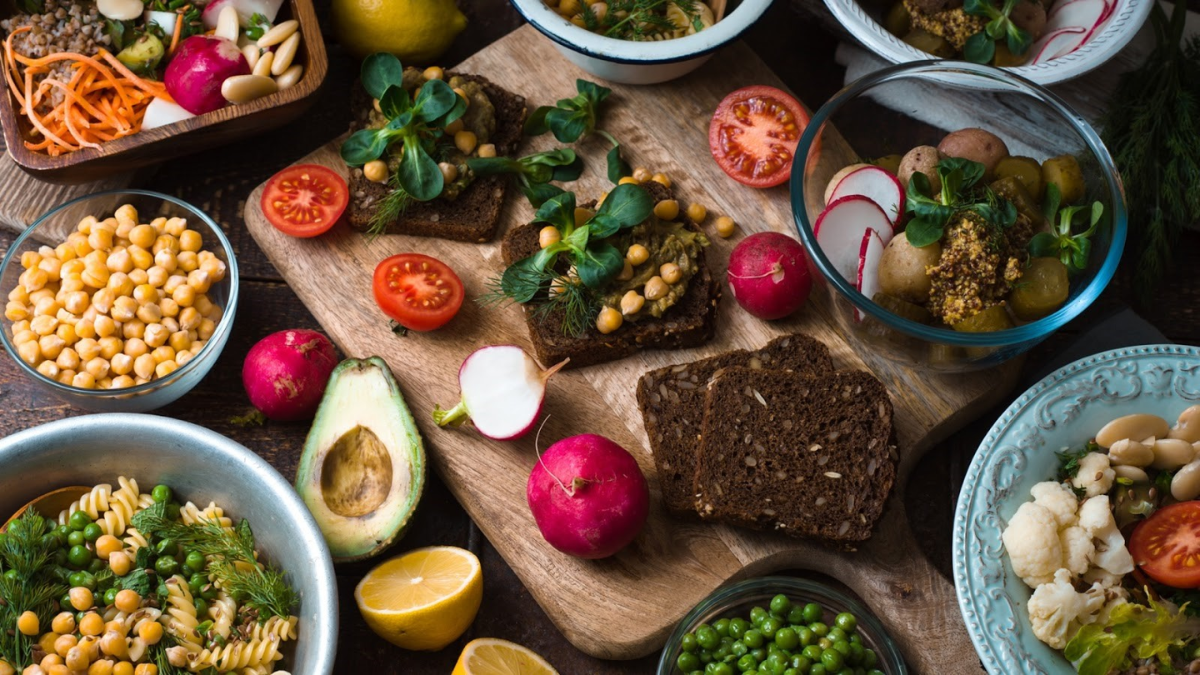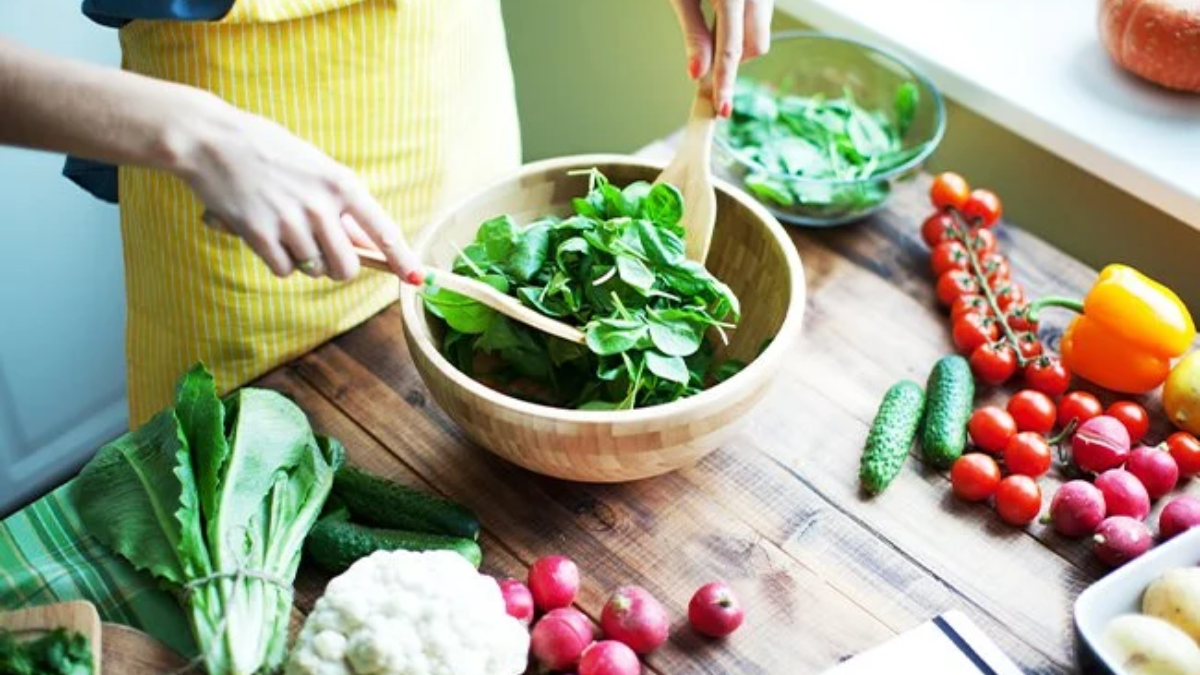In recent years, the vegetarian diet has become increasingly fashionable. According to certain studies, up to 18 percent of people worldwide are vegetarians. A well-planned vegetarian diet may help you lose weight, lower your risk of chronic disease, and enhance the quality of your diet, in addition to the moral and environmental advantages of giving up meat. Most people found that vegetarianism allows them to try different dishes, and they frequently report feeling better and happier since making the change.
There are several advantages to eating a vegetarian diet. If properly implemented, it will significantly improve the environment, animal welfare, and your health. A vegetarian diet can also enable you to spend less and accumulate more savings. Especially in comparison to its vegetarian substitutes of vegetables, grains, and beans, meat and fish are frequently pricey.
What is the Exactly a Vegetarian Diet?
The vegetarian diet forbids the consumption of meat, fish, and fowl. People frequently switch to a vegetarian diet for ethical grounds, such as animal rights and personal or religious ones. Some people choose to go vegetarian for environmental concerns. Raising animals uses a lot of energy and natural resources, which increases greenhouse gas emissions and contributes to climate change. Vegetarianism comes in various varieties, each with its own set of limitations.
The most common types include:
- Lacto-ovo-vegetarian diet: Excludes meat, fish, and poultry but includes dairy and eggs.
- Lacto-vegetarian diet: Excludes dairy products but allows fish, poultry, and eggs.
- Ovo-vegetarian diet: Accepts eggs but bans meat, fish, poultry, and dairy products.
- Pescetarian diet: Excludes meat and poultry but includes fish, perhaps with eggs and dairy.
- Vegan diet: Excludes all animal products, such as honey, meat, poultry, fish, eggs, and dairy.
- Flexitarian diet: A diet primarily vegetarian but occasionally includes meat, fish, or fowl.
What can Vegetarians Eat?
A varied selection of fruits, vegetables, grains, healthy fats, and proteins should be part of a vegetarian diet.
Include a variety of protein-rich plant foods like nuts, seeds, legumes, tempeh, tofu, and seitan in your diet to replace the protein meat. Dairy products and eggs can help you receive more protein if you eat a lacto-ovo-vegetarian diet. Consuming nutrient-dense whole foods, such as fruits, vegetables, and whole grains, can give you access to crucial vitamins and minerals, helping to make up for any nutritional deficiencies in your diet.
A few healthy foods to eat on a vegetarian diet are:
- Fruits: Apples, bananas, berries, oranges, melons, pears, peaches
- Vegetables: Leafy greens, asparagus, broccoli, tomatoes, carrots
- Grains: Quinoa, barley, buckwheat, rice, oats
- Legumes: Lentils, beans, peas, chickpeas.
- Nuts: Almonds, walnuts, cashews, chestnuts
- Seeds: Flaxseeds, chia, and hemp seeds
- Healthy fats: Olive oil, avocados
- Proteins: Tempeh, tofu, seitan, natto, nutritional yeast, spirulina, eggs, dairy products
Foods to Avoid
Vegetarianism comes in various forms, each with its limits. The most popular form of vegetarianism, Lacto-ovo vegetarianism, forbids eating meat, poultry, or fish. Vegetarians of other varieties might also abstain from things like dairy and eggs. The strictest type of vegetarianism, a vegan diet,t forbids consuming animal products, including meat, poultry, fish, eggs, dairy, and fur.
On a vegetarian diet, you might need to stay away from the following items depending on your needs and preferences:
- Meat: Beef, veal, and pork
- Poultry: Chicken and turkey
- Fish and shellfish: This restriction does not apply to pescetarians.
- Meat-based ingredients: Gelatin, lard, carmine, isinglass, oleic acid, and suet
- Eggs: This restriction applies to vegans and lacto-vegetarians.
- Dairy products: This milk, yogurt, and cheese restriction applies to vegans and ovo-vegetarians.
- Other animal products: Vegans may avoid honey, beeswax, and pollen.
How to Achieve a Balanced Vegetarian Diet?
Here is an example of how to follow a balanced vegetarian diet:
Example No. 1
- Breakfast: Porridge made with uncooked oats, 250ml whole milk, and a pear.
- Lunch: Cheese omelet paired with a salad made of four cherry tomatoes, rocket leaves, cucumber, and 20g of walnuts.
- Dinner: Roasted cauliflower, paneer, and chickpea curry with boiled spinach.
- Pudding: 125g plain Greek-style yogurt and 80g raspberries.
- Snacks: 30g portion of almonds, a part of blueberries, healthy hummus with sliced peppers, and an amount of spicy roasted chickpeas.
- Milk: 225ml semi-skimmed milk.
Example No. 2
- Breakfast: Two poached eggs on two slices of medium granary toast, with vegetable oil-based spread.
- Lunch: Roast butternut squash and red lentil soup.
- Dinner: Portobello mushroom burgers and a baked sweet potato.
- Pudding: Warm exotic fruit salad and 125g Greek yogurt.
- Snacks: 10g walnuts, a banana, crispbread with cottage cheese and cherry tomatoes, three squares of dark chocolate, and 80g raspberries.
- Milk: 225ml semi-skimmed milk.
Example No. 3
- Breakfast: Two wheat biscuits with 200ml semi-skimmed milk and a medium banana.
- Lunch: Two servings of warm lentil and goat’s cheese salad with a tablespoon of linseeds.
- Dinner: Aubergine and courgette parmesan bake with cooked couscous and broccoli.
- Pudding: One slice of malt loaf with vegetable oil-based spread.
- Snacks: 30g dried apricots, 30g almonds, 80g blueberries, 125g Greek yogurt, and an orange.
- Milk: 225ml whole milk.
What are the Benefits of a Vegetarian Diet?
There are several advantages to eating a vegetarian diet. If properly implemented, it will significantly improve the environment, animal welfare, and your health. A complete explanation of these advantages can be found here:
Health Benefits
Here are the health benefits of a vegetarian diet:
- In particular, compared to a non-vegetarian diet, a vegetarian diet is naturally high in fiber, vitamins, and nutrients and low in saturated fat.
- It has been demonstrated to lower the risk of health issues like heart disease, several forms of cancer, and Type 2 diabetes. Additionally, weight loss and a reduced BMI are related to it.
- Vegetarianism lacks the nutrients found in fish, pork, and poultry worries some people; however, a vegetarian diet contains all these. Since most animals derive protein from plants, a vegetarian diet ensures you get all the necessary nutrients.
- To achieve this balance in your health, like with any diet, you must eat the proper foods in the right quantities.
- Even though a pizza, chips, and chocolate diet may still be appropriate for vegetarians, it won’t give you the nutrients you need, so you probably won’t experience any health benefits. It might even make you feel worse.
- You must continue to maintain the proper balance in your diet. Since meat is a source of protein, you must substitute other sources. For instance, protein can be found in lentils, chickpeas, eggs, cheese, tofu, tempeh, and other meat-free seeds such as mycoprotein (Quorn products).
- You can also get it from green vegetables with leaves, such as spinach and broccoli, so there are many foods you can eat to make sure you get the nutrients you need.
Environmental Benefits
Numerous studies have shown that a vegetarian or vegan diet is good for the environment. According to a 2018 Oxford University study, cutting out meat and dairy is the best strategy to lessen your influence on the planet. Vegetarianism will reduce your carbon footprint and your contribution to climate change. Because a vegetarian diet generates 2.5 times fewer carbon emissions than a meat one, this is true.
The environmental benefits of adopting a vegetarian diet are vast. In addition to the reasons explained above, it can also reduce:
- The amount of methane and nitrous oxide produced by cattle. Like carbon dioxide, these gases contribute to global warming. If these animals aren’t bred at the rate at which they currently are to meet human demand, the amount of these gases produced will decrease.
- The pollution of water. Rivers and seas can often be polluted by materials involved in the production of livestock. For example, animal waste, antibiotics, pesticides, and fertilizers are all known pollutants associated with livestock. Commercial fishing can also pollute the oceans and harm ecosystems. Wastewater may include fish waste from gutting and bleeding, and detergents and disinfectants used to clean the holding tanks. Nets and other fishing gear may even be discarded in the oceans.
- The destruction of rainforests. Much of the land used for animal agriculture or growing crops that become animal feed would otherwise be natural habitats such as rainforests. As well as causing deforestation, land used for livestock farming often becomes overgrazed, resulting in soil erosion and desertification.
- The endangerment of species. The destruction of rainforests and other habitats creates an unstable environment and disrupts the natural food chain. This threatens species already under threat, mainly due to human behavior, and puts some at risk of endangerment and possibly even extinction.
Animal Welfare
People frequently choose to become vegetarians because they understand that eating fish, meat, and poultry involves unnecessary cruelty that may be avoided.
- Numerous animals are raised in cramped quarters with little room to roam. As a result, they frequently have health issues, such as bacterial infections in the case of hens and bone abnormalities.
- The animals are then moved over large distances to be killed, where they can experience suffocation and scalding heat. If they make it through this journey unscathed, they are killed in various ways, inflicting the animal’s agony and suffering; they are frequently stunned before bleeding to death.
- Going vegetarian is one method for some people to stop participating in this. You should be aware that while it undoubtedly helps, the methods used to produce the animal by-products that vegetarians consume, such as eggs and cheese, also involve a tremendous deal of mistreatment and cruelty.
- Animal products are not necessary for humans to ingest to stay healthy and receive all the needed vitamins and nutrients.
Conclusion
If you’ve been thinking about going vegetarian, you now know more about the advantages and the kinds of food you can eat. Being a vegetarian need not entail a limited menu and a lack of options. You’ll discover that nearly every restaurant or cafe offers at least one vegetarian choice and frequently several. If done correctly, eating compassionately will help you live kindly, be aware of what you’re putting into your body, and leave less carbon imprint while also making you feel healthy and happy.
Although some also limit eggs, dairy, and other animal products, most vegetarians abstain from eating meat, poultry, and fish. If poorly planned, a balanced vegetarian diet that includes nutrient-dense foods like fruit, grains, healthy fats, and plant-based protein may raise your risk of nutritional deficiencies. Please pay particular attention to a few essential elements and include a variety of healthy whole foods in your diet to complete it. By doing this, you can minimize the negative impacts of vegetarianism while still reaping its benefits.


